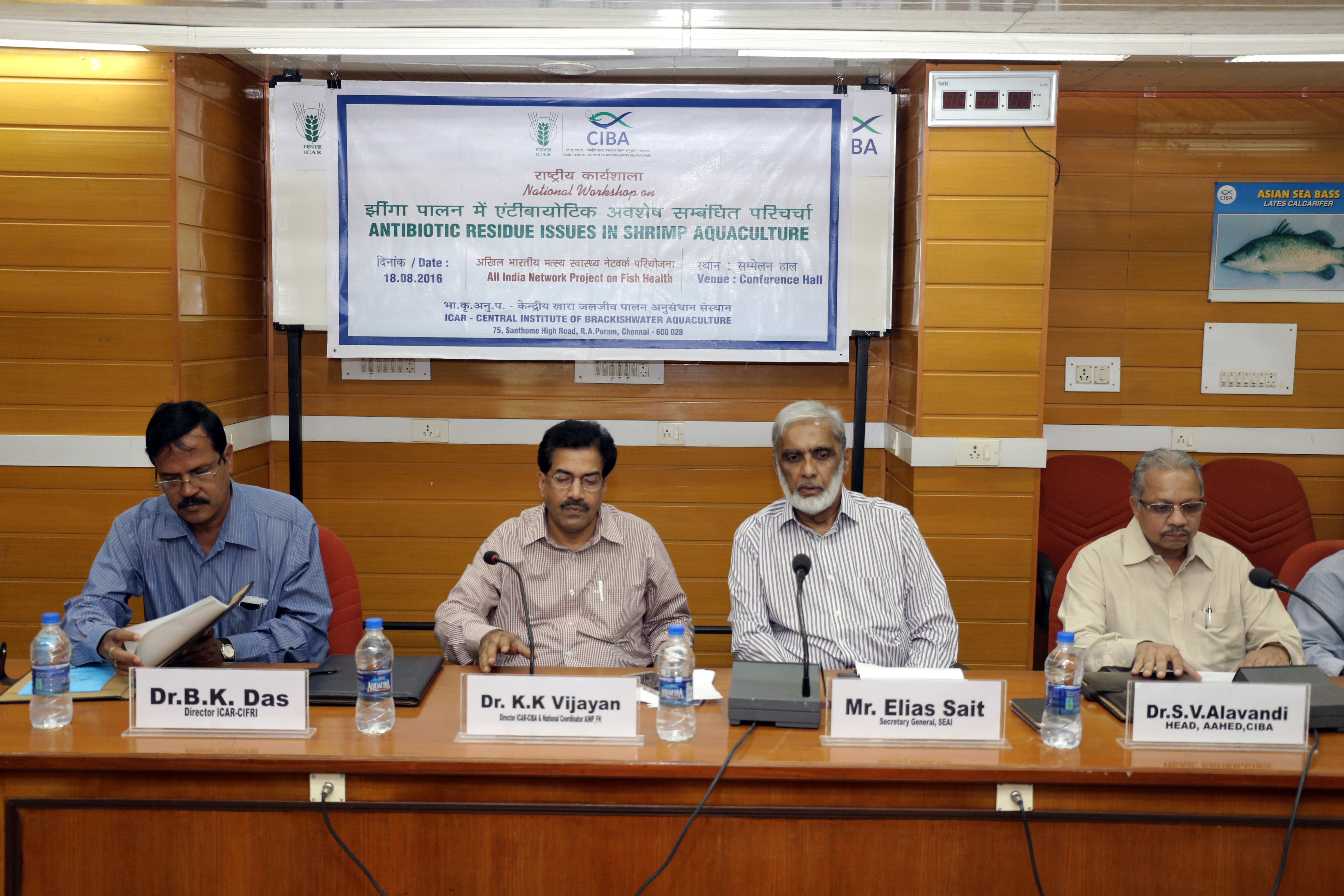While the current Indian shrimp aquaculture sector has achieved spectacular growth in the recent years, since the introduction of the Pacific white shrimp Penaeus vannamei, the issue of antibiotic residue and related rejection of export consignments, ICAR-CIBA along with its network partners in fish health network has taken proactive initiatives to address this very important issue. In this direction to create awareness and to sensitize the farmers and stakeholders, a national workshop was conducted at ICAR-CIBA on 18th August 2016. The programme received an overwhelming response from representatives of different stakeholders viz. farmers, NFDB, PFFI, SEAI, SAP, hatchery operators, consultants and private entrepreneurs.
The chief guest of this programme Dr B. K. Dash, Director, CIFRI, Barrackpore mentioned the important role of research organizations in handling this issue. He stressed that the withdrawal period of antibiotics should be known before using the same and advocated the use of alternative strategies such as vaccines to minimise the usages of antibiotics. He also invited all the players in the shrimp farming and exporting sector to take necessary steps and set a global standard for Indian products to prevent the degree of rejection. He opined that it is very much necessary to get united and find a solution to this important problem. The senior consultant from NFDB, Hyderabad, Dr V. V. Sugunan sensitized the audience to learn lessons from the past mistake, we have confronted in the shrimp farming and stressed to explore the science behind the use and misuse of antibiotics and set up a draw national plan to address the problem. Dr Utpal Sar, Executive Director, NFDB, Hyderabad indicated that the issue is equally important for the health of the Indian population as 10% of the farmed shrimp enters the domestic market. He assured all the help from NFDB through funding support in dealing with the present issue.
Guest of Honour for the programme Mr Elias Sait, Secretary-General, Seafood Export Association of India advised to first look as to why this antibiotic residue is an issue at all. As shrimp survival is important for farmers, this should be looked into to improve in an alternate way. He pointed out the responsibility and important role of SEAI while dealing with all levels in shrimp farming. He stressed the important role of CIBA as a research organization and highlighted the significance of the partnership between CIBA and SEAI, and the MOU in place to deal with antibiotic residue issue. Quoting a letter from USFDA, Mr Sait indicated the seriousness of the problem and its possible compounded effects for all in the value chain, from hatchery to farmer to exporter. Therefore, he also stressed on the point of putting all the hands together to solve the issue at the earliest possible time.
While delivering the presidential address, Dr K. K. Vijayan, Director, CIBA informed that as a nodal R&D agency, CIBA has rightly realised the issue considering the future of the multibillion-dollar Indian shrimp farming industry. He indicated about the world-class research facilities that present in CIBA and other partnering ICAR institutes such as CIFT-Kochi and invited the stakeholders to take full advantage of the national facility. He mentioned about the three important national programmes that are already being carried out in CIBA and the MoU with SEAI to deal with antibiotics problem. As CIBA has already set a platform and framework, he invited all the stakeholders and other players to come together and work on this important aspect. He also offered all the personnel involved with the issue to share the strength and weakness and have a free mind while working together in solving the antibiotic residual problem in shrimp.
Subsequently, research activities and other issues were already taken up by CIBA were presented by Dr P. K. Patil. Dr Ashok Kumar, CIFT, Kochi made a presentation on the challenges in the detection, monitoring of antibiotic residues with special references to Indian shrimp farming and way forward in the traceability of antibiotic residues. Mr V. Balasubramanian, Prawn Farmers Federation Association made a presentation on stakeholders perception and he ensured the co-operation and participation in solving the antibiotic issues. This was followed by a round table discussion involving participants from different sectors. It was unanimously felt that a timely initiative has been taken and this should be made as a platform while preparing the steps to way forward in order to solve the antibiotic residue issue in the shrimp aquaculture sector.
Earlier Dr P. Patil, Senior Scientist and the organizing secretary of the program welcomed the dignitaries and pointed out the importance of the meeting and stressed need for multipronged approach targeting all the levels of shrimp production from hatchery to processing units. In his introductory remark, Dr S. V. Alavandi, Head Aquatic Animal Health and Environment Division indicated the problem of antibiotic usage is being practised due to lack of awareness among farmers. He mentioned that the issue has already been taken very seriously by CIBA and accordingly work has been initiated through the institute and funded projects. In this regards, he appreciated the support rendered by the Seafood Exporters Association of India. The meeting concluded with vote of thanks by Dr S. K. Otta, CIBA, Chennai.
[Best_Wordpress_Gallery id=”49″ gal_title=”National workshop shrimp aquaculture”]
